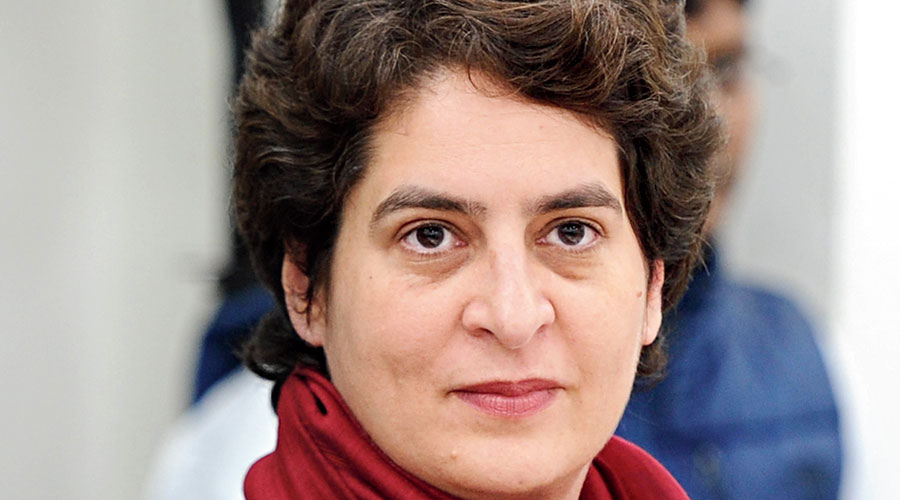Priyanka Gandhi Vadra, who is in charge of the Congress in Uttar Pradesh, pointed to one of the gravest ills afflicting Indian polity while commenting on the alleged encounter of gangster Vikas Dubey: “The criminal is gone. What about those who give protection to crime?”
The Opposition party general secretary later put out a video message, saying: “The BJP government has transformed Uttar Pradesh into a crime state. In every aspect of criminality, Uttar Pradesh tops the chart in the country. Criminals have set up business empires and everybody knows this is done under political patronage.”
Priyanka said the entire truth about who nurtured and protected criminals like Vikas, accused of masterminding the killing of eight policemen and believed to have been politically connected, must come out. “Unless the nexus between criminals and politicians is exposed, justice cannot be delivered,” she said.
Priyanka demanded an inquiry by a sitting Supreme Court judge into the entire episode, which started on July 3 with the ambush on the cops in Kanpur Rural district and ended on Friday with the alleged encounter killing of Vikas a day after he was arrested from Ujjain in Madhya Pradesh. In the intervening period, five of Vikas’s aides had been killed in police encounters.
Congress communications chief Randeep Surjewala echoed this sentiment, saying: “Vikas Dubey was a pawn of organised crime. Who runs this syndicate? Was he killed to bury the secrets he knew about the powerful of the state who gave him protection so far? Was his elimination necessary to prevent the exposure of the criminal-politician nexus? Why would he surrender if he intended to flee? Why were the media vehicles following the police cavalcade stopped? How come the bullets hit his chest when he was fleeing?”
Pointing to the need for a judicial probe, Surjewala said: “This is a test case for (Uttar Pradesh) chief minister Yogi Adityanath and Union home minister Amit Shah to show that they are serious about exposing the criminal-administration-political nexus. This is their acid test — whether they will demonstrate the courage and commitment to expose the nexus.”
Congress leader P.L. Punia drew attention to photographs that purport to show Vikas’s aides with top police officers and BJP leaders to claim a nexus and express doubts about the alleged encounter.
The concern over a politician-criminal nexus is not new. While people with muscle power have always played a role in politics, allegations of institutionalised criminalisation of politics have been tormenting sections of senior leaders for the past three-four decades.
The much-publicised N.N. Vohra Committee report in 1993 on the nexus between crime and politics had documented the extensive rot in the system in exhaustive detail but the report was never placed in Parliament.
Almost every important party has ruled India between 1993 and 2020 but none of the governments chose to act seriously on the issue.
Judicial interventions were made time and again to cleanse the system but did not yield the desired results in the absence of concrete political action plans.
In 2002, the Supreme Court delivered a landmark judgment making it mandatory for every candidate contesting elections to declare the criminal cases they face and the assets they possess. In 2018, the Supreme Court again expressed grave concern over the criminalisation of politics and asked the government to frame a strong law to ensure people facing charges of heinous crimes are not allowed to contest elections.
But more and more people with criminal records have made their way into Parliament and Assemblies.
Campaigning as the BJP’s prime ministerial candidate in 2014, Narendra Modi had made criminalisation of politics a big issue and repeatedly promised in interviews and public rallies that he would throw out all tainted members within a year of coming to power. He had declared that he would set up a committee to identify such members and ask the Supreme Court to prosecute them. “Nobody, not even BJP leaders, will be spared,” he had thundered, evoking lusty cheering from crowds.
Although Modi’s track record as Gujarat chief minister had belied his claims as he had not only refused to act against members facing criminal charges but had also retained convicted ministers, people had trusted him to cleanse the system.
Six years after becoming Prime Minister, Modi’s promise has remained unfulfilled.
In 2009, there were 86 MPs in the Lok Sabha who had been facing criminal charges. The figure increased to 115 in 2014. In 2019, as many as 43 per cent of MPs faced criminal charges, including 116 of the 303 BJP members. As for the Congress, 29 of its 52 Lok Sabha members faced criminal charges.
The alleged encounter killing of Vikas has reignited this debate, offering another opportunity to Modi to fulfill his promise of cleansing the system.











